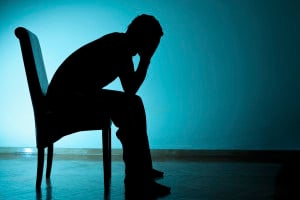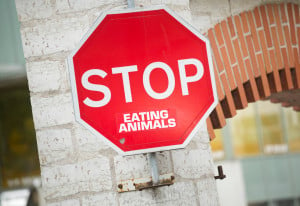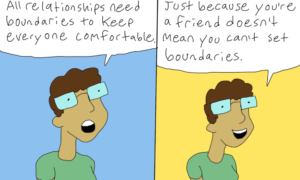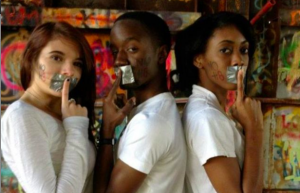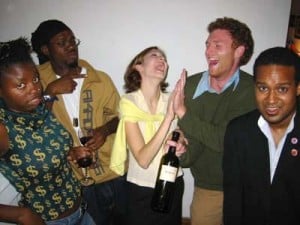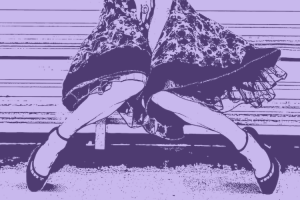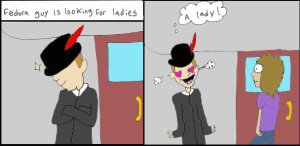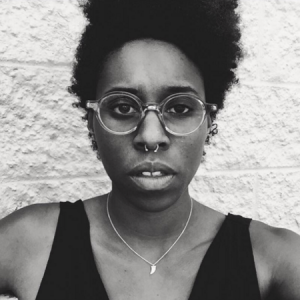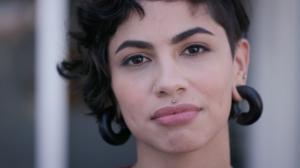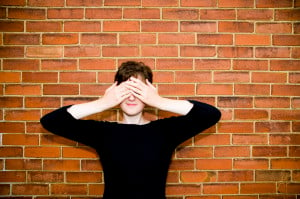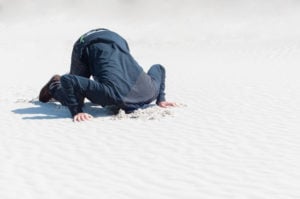
Source: Literally Darling
Originally published on Feminspire and cross-posted here with their permission.
In high school, having to talk about sex wasn’t too much of a problem for me.
It wasn’t something many of my close friends had done, so we didn’t bring it up that often. Plus, I had enough experience that I could contribute to any conversations or games of “Never Have I Ever” if necessary.
When I got to college though, it seemed like so many of the “getting to know you” discussions involved who you had hooked up with and how and so on and so on.
It wasn’t that I didn’t have any past stories to contribute, it was just that sometime in between high school and these discussions with new college friends, I had realized something about myself: I wasn’t sexually attracted to anyone.
I didn’t see people and fantasize about hooking up with them, or even really factor it into my relationships or encounters with people (except for a constant slight panic about what sexual things they expected from me).
I am 100% for being comfortable with discussing sexualities and sexual experiences – whether it’s straight vanilla sex or the wildest, kinkiest sex you could imagine – because it’s important in allowing people to be spokespeople for their own choices and actions.
But we must also be careful that we don’t get so excited that we cause problems for those of us who have little to no interest in sex or any sexual activities of any kind.
There is actually very little research that has been done on asexuality, but a commonly quoted study from the Journal of Sex Research in 2004 states the prevalence to be about 1% — obviously likely much lower than the actual number because of those who do not openly identify for whatever reason.
An asexual is someone who does not experience sexual attraction.
This does not necessarily mean that they do not experience sexual arousal, or romantic or aesthetic attraction, or that they do not want intimacy from their relationships.
You can even be an asexual and masturbate or have sexual encounters.
Sexuality is a spectrum, on which asexuality falls at one end, but everyone who identifies as an asexual is an individual.
You can be asexual and heteroromantic, or asexual and homoromantic, or asexual and aromantic, or anything in between.
The ace-spectrum often contains demisexuals – those who only experience sexual attraction after forming a strong emotional connection – and graysexuals — those who only very rarely experience sexual attraction.
Asexuality is noticeably separate from celibacy or an abstention from sexual activities as there is an important distinction to be made between behavior and attraction.
And there are asexuals who will engage in sexual activity for various reasons.
In our uber-sexualized society, asexuals face a large amount of discrimination and judgment, not just from their heterosexual peers, but also from those across the gender and sexuality spectrums.
Male-identifying asexual, for instance, do not tend to engage in the traditional locker-room talk or the congratulation of sexual exploits that many of us are so fond of. They usually don’t gossip over the attractive people in their lives and what they’d like to do to them.
Female-identifying asexual, on the other hand, are often accused of being prudish, or playing hard to get.
All asexuals can be subject to being ostracized, especially as adolescents when most of the talk revolves around sex and relationships, for being unable to relate or understand why sex is this coveted topic.
They are often the brunt of comments about “missing out” on all the “great sex in the world,” or about just needing to “find the right person.”
An only recently identifying asexual, by most definitions, there was actually a time in my life where I qualified as a fairly sexually active person. I just didn’t like it, or crave it, or see people and connect to them sexually.
For me, sex was a way of trying to get intimacy from a relationship, and unfortunately, it was a method that largely failed me because other people didn’t see it the same way I did.
I thought there must be something wrong with me for me not to want it.
For a long time, it didn’t even occur to me that there was a sexual orientation that defined me, or that there were other people out there like me who didn’t see relationships with people through a sexual lens.
I ended up in a lot of damaging relationships because I thought sex was what was expected of me and that it was what I was supposed to give in a relationship.
Understanding this new world of asexuality has been an important step in coming to terms with these unwanted sexual experiences.
And for a lot of asexuals, being able to say they are asexual is an incredibly important identifier and “coming out” is just as much of step as it is for those who do not define themselves as heterosexuals.
I in absolutely no way speak for all or any asexuals, because the ace-spectrum is just as diverse as the actively sexual spectrum.
The Asexuality Visibility and Education Network (AVEN) provides some very detailed informational resources, as well as an online forum for questions and discussion.
There is also some really great information out there for relationships with asexuals (as well as just some really great tips for how to have sex that is 100% consensual even if all involved partners are sexual!).
The best thing we can do is to be informed, either about our own sexualities or how others identify, and open to the possibility that those around us do not see sex the way we do.
Even among sexual people, there is a wide range of acts and people and situations that are turn ons or turn offs. Why should it be so radical that some of us exist outside of this blurred wheel of options?
Sometimes it may seem that every time we turn around there’s a new possible orientation we have to consider.
It is important that, not only is there nothing wrong with having sex, saving it, having it with one person or different people or a person of the same gender, there is also nothing wrong with not having or wanting it.
[do_widget id=‘text-101′]
Search our 3000+ articles!
Read our articles about:
Our online racial justice training
Used by hundreds of universities, non-profits, and businesses.
Click to learn more





